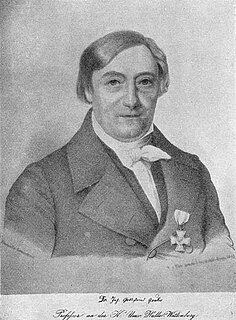
Johann Albert Fabricius was a German classical scholar and bibliographer.

Johann Georg Walch was a German Lutheran theologian.

Johann August Ernesti was a German Rationalist theologian and philologist. Ernesti was the first who formally separated the hermeneutics of the Old Testament from those of the New.

Johann Gottfried Gruber was a German critic and literary historian.
Georg Benedikt Winer, German Protestant theologian, known for his linguistic studies of the New Testament.

Johann Jakob Grynaeus or Gryner was a Swiss Protestant divine.

Simon Grynaeus was a German scholar and theologian of the Protestant Reformation.

Johann Gottlieb Heineccius was a German jurist from Eisenberg, Thuringia.

Justus Jonas, the Elder, or simply Justus Jonas, was a German Lutheran theologian and reformer. He was a Jurist, Professor and Hymn writer. He is best known for his translations of the writings of Martin Luther and Philipp Melanchthon. He accompanied Martin Luther in his final moments.

Johann Pfeffinger was a significant theologian and Protestant Reformer.

Johann Wilhelm Baier was a German theologian in the Lutheran scholastic tradition. He was born at Nuremberg, and died at Jena.
The Philippists formed a party in early Lutheranism. Their opponents were called Gnesio-Lutherans.

Johann Benedict Carpzov II was a German Christian theologian and Hebraist. He was a member of the scholarly Carpzov family.

Johann Gottlob Carpzov was a German Christian Old Testament scholar, a nephew of Johann Benedict Carpzov II and a son of Samuel Benedict Carpzov. He was the most famous and most important Biblical scholar of the Carpzov family. He was titular professor of Oriental languages at Leipzig from 1719 to 1730, and preacher and theologian until his death. Like his uncle, he was an opponent of the Pietists. His critical works are: Introductio in Libros Vet. Test. 1721, 4th ed. 1757; Critica Sacra, 1728; Apparatus Historico-Criticus Antiquitatum et Codicis Sacri et Gentis Hebrææ, 1748. The Apparatus is in the form of annotations to Thomas Goodwin's Moses and Aaron, and appended to it are dissertations on "The Synagogue Treated with Honor", on "The Charity System of the Ancient Jews", and others.

Johann Friedrich Gleditsch was a major book publisher in the late 17th and early 18th centuries.
Wolfgang Hirschbach was a German legal scholar.

Benedikt Carpzov was a German legal scholar. After studying at Frankfort and Wittenberg, and visiting other German universities, he was made doctor of law at Wittenberg in 1590. He was admitted to the faculty of law in 1592, appointed professor of institutions in 1599, and promoted to the chair Digesti infortiati et novi in 1601. In 1602 he was summoned by Sophia, widow of the elector Christian I. of Saxony, to her court at Colditz, as chancellor, and was at the same time appointed councillor of the court of appeal at Dresden. After the death of the electress in 1623 he returned to Wittenberg, and died there on 26 November 1624, leaving five sons. He published a collection of writings entitled Disputationes juridicae. Benedikt Carpzov Jr. (1595–1666), second of the name, was the second son of the preceding, and like him was a great lawyer.
Maximilian Mörlin was a Lutheran theologian, court preacher, Superintendent in Coburg, and Reformer.

Aegidius Strauch was a German mathematician and theologian.

Benedikt Carpzov the Younger was a German criminal lawyer and a witchcraft theoretician who wrote extensively on witch processes. He is considered the founder of the German jurisprudence. He is also known under pen-name Ludovicus de Montesperato.



















